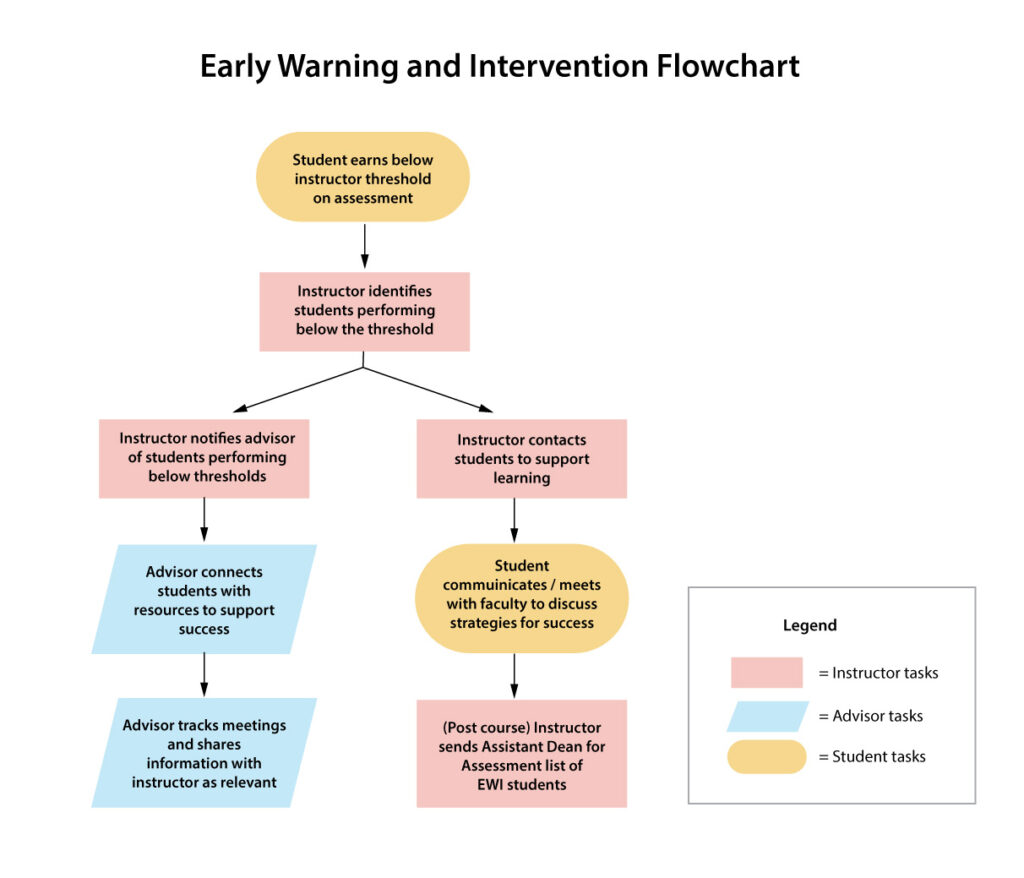Approved by Assessment Committee May 30, 2018
Revised and Approved May 17, 2022
Revised and Approved Dec 9, 2025.
Purpose
The UW–Madison School of Pharmacy wants every student to succeed. If a student struggles early in a course, the Early Warning and Intervention (EWI) process helps identify problems and provides support before the semester ends. This policy ensures timely communication and action to improve student success and meets Accreditation Council for Pharmacy Education’s Standards 2025 4.4.b.
With Whom and Where it Applies
- All required pre-APPE PharmD courses (not electives)
- Students at risk of earning a D or F in the course
- Students may be referred to EWI more than once in a semester if needed
How Early Warning and Intervention Works
Instructors are responsible for determining which assessments trigger (such as exams or projects) the Early Warning and Intervention process. Students contacted for EWI should engage with the recommended intervention process (ie. meet with instructor, advisor, discuss strategies for success). If a student does not engage in the intervention process, they may lose the opportunity to remediate the course later. Advisors and instructors work together to monitor student progress and provide support throughout the course.
Early Warning and Intervention Procedures
- Identify EWI students: After major assessments, instructors review scores or other performance indicators and identify students at risk of earning a D or F in the course.
- Notify advisor and student: Instructors contact at-risk students and notify the class advisor regarding who has been contacted. Advisors may also request a list of at-risk students.
- Meet with instructor: Student should communicate/meet with the course instructor before the next assessment to review content and plan improvements.
- Meet with advisor (as requested): Student meets with advisor to discuss challenges and strategies for success.
- Monitor progress: Advisor and instructor track improvement and document actions.
Checklist by Role
Student
- Attend class and participate
- Respond to EWI outreach and engage with instructor/advisor
Instructor
- Include EWI policy in syllabus
- Identify and notify students performing below EWI thresholds
- Notify advisor about students performing below EWI thresholds
- Communicate with students to support future success in the course, which may include reviewing content, study strategies. and available resources
- Send Assistant Dean for Assessment list of EWI students at end of semester
Advisor
- If requested by instructor, connect students with resources to support their future success in the course
- Track meetings and share information with instructor
Assessment Committee-Assistant Dean for Assessment
- Maintain documentation for Student Success Tracker
- Monitor trends and report to committees

PharmD Handbook Sections
This is an accordion element with a series of buttons that open and close related content panels.
Flow Chart Outline Description
Title: “Early Warning & Intervention Flow Chart”
- Top of chart begins: “Student earns below instructor threshold on assessment.”
- Next: “Instructor evaluates students performing below the threshold.”
- Concurrent Path 1: “Instructor Notifies Advisor of students performing below thresholds.”
- Next: “Advisor connects students with resources to support success.”
- Next: “Advisor tracks meetings and shares information with instructor as relevant.”
- Concurrent Path 2: “Instructor contacts students to support learning.”
- Next: “Student communicates / meets with faculty to discuss strategies for success.”
- Next: “(Post course) Instructor send Assistant Dean for Assessment list of EWI students.”
- Concurrent Path 1: “Instructor Notifies Advisor of students performing below thresholds.”